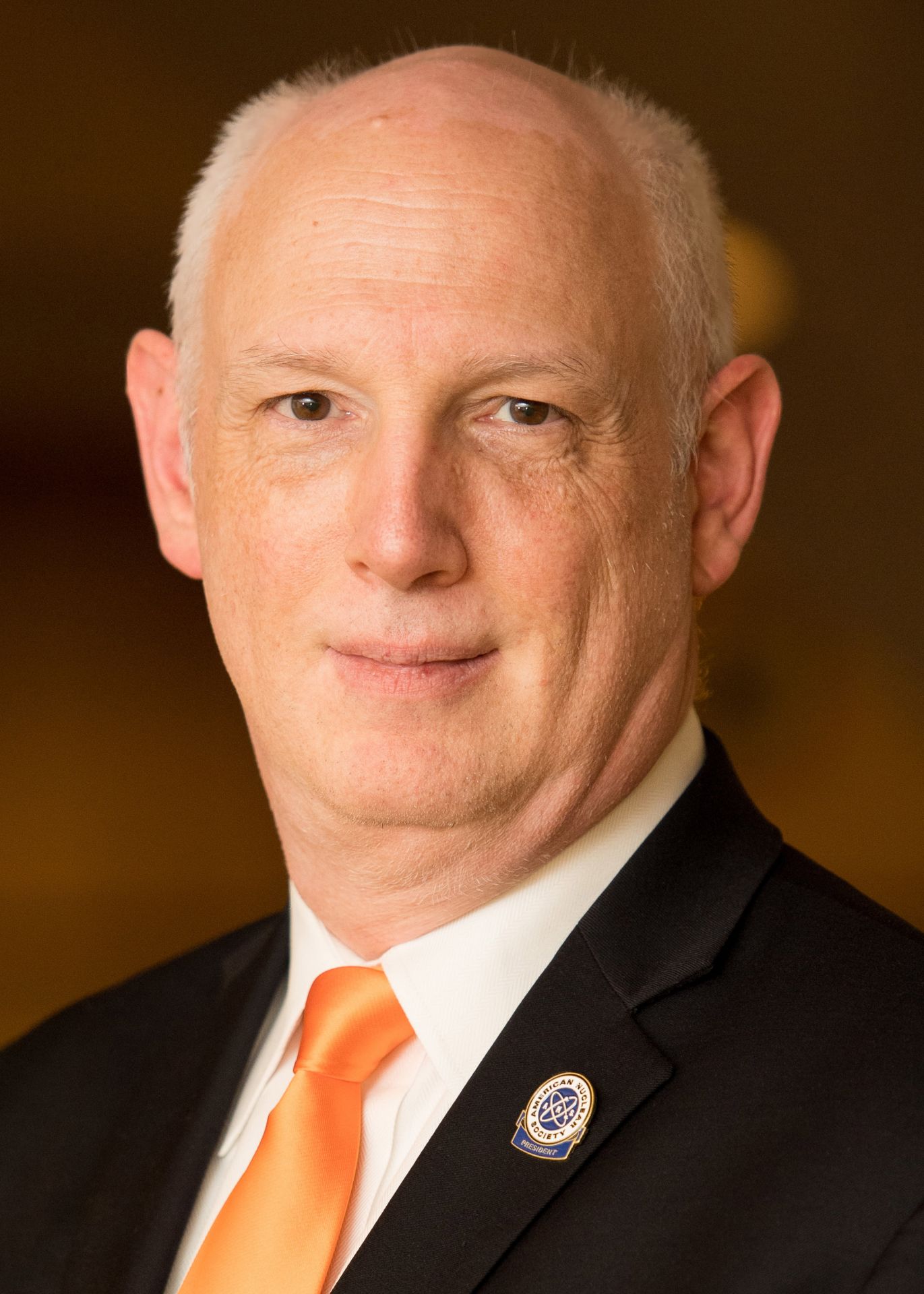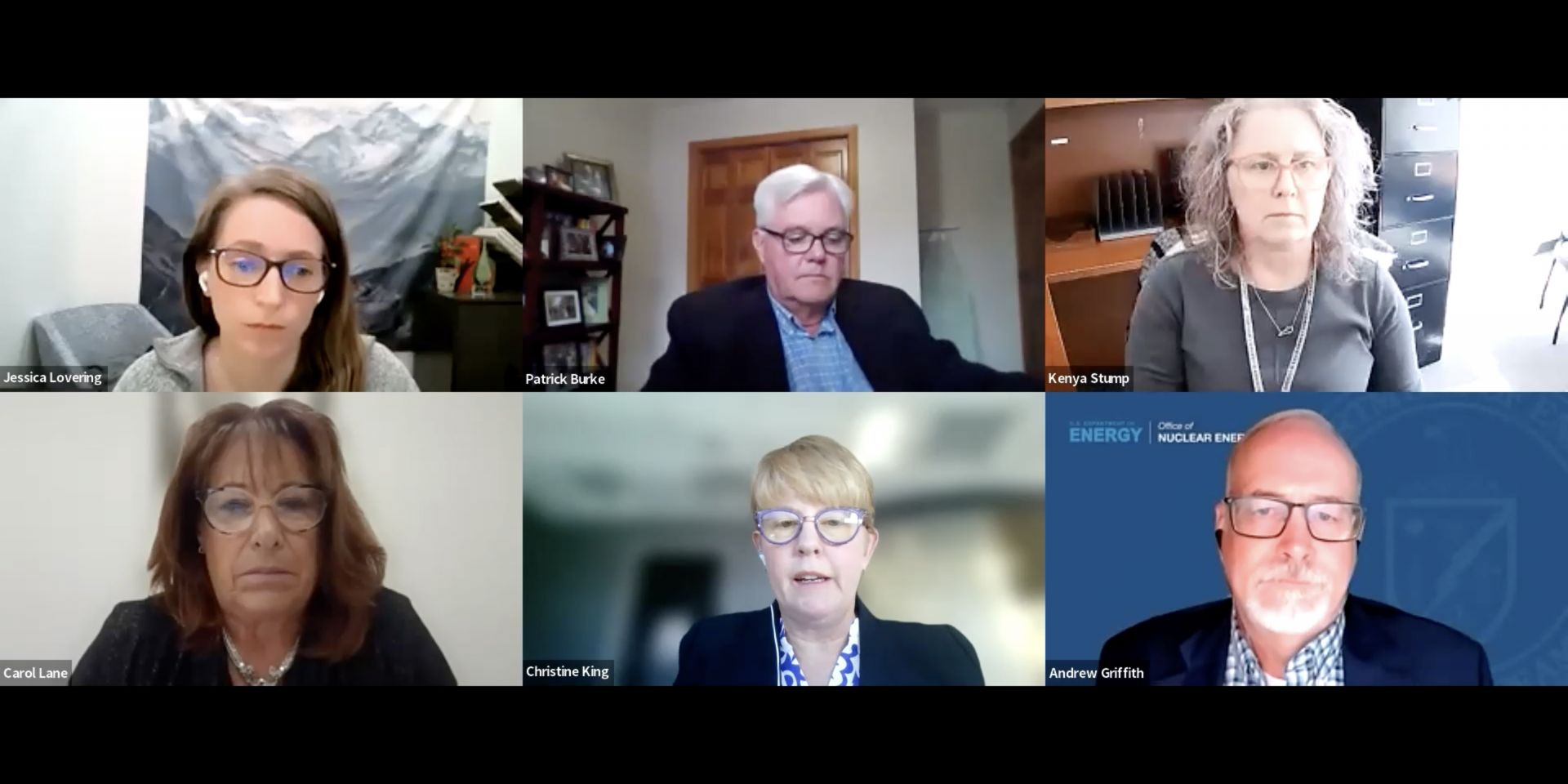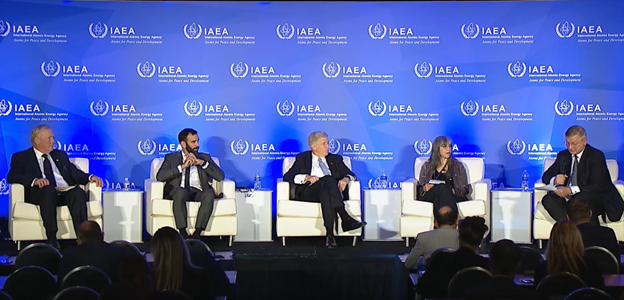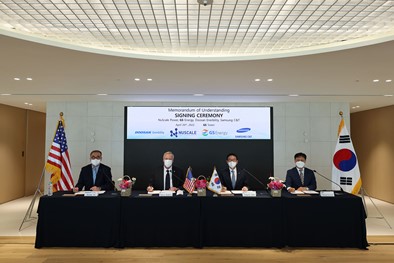ANS's “Powering Our Future: The Coal to Nuclear Opportunity” panel discussion featured (top left, clockwise) Jessica Lovering, Patrick Burke, Kenya Stump, Andrew Griffith, Christine King, and Carol Lane. (ANS screenshot)
Since at least June of last year—when TerraPower and PacifiCorp announced plans to site the Natrium reactor demonstration project at one of Wyoming’s retiring coal plants—the concept of repurposing those plants to host nuclear reactors has been a popular topic of conversation among the energy cognoscenti.
Participating in the forum were (from left) John Hopkins (NuScale Power), Renaud Crassous (EDF), Daniel Poneman (Centrus Energy), Adriana Cristina Serquis (CNEA), and Boris Schucht (Urenco).
The nuclear industry leaders assembled in Washington, D.C., last week to discuss small modular reactor supply chains agreed that lost generation capacity from the expected retirement of hundreds or thousands of coal power plants over the next decade—a cliff, in one panelist’s words—represents an opportunity that developers of SMRs and advanced reactors are competing to meet.
“I think in total 80 projects are ongoing,” said Boris Schucht, panel moderator and chief executive officer of Urenco Group, as he opened the forum. “Of course not all of them will win, and we will discuss today what is needed so that they can be successful.”
Conceptual layout and deployment of a Prodigy SMR Marine Power Station with 12 NuScale Power Modules. (Graphic: Business Wire)
NuScale Power and Prodigy Clean Energy announced on October 26 that they have developed a conceptual design for a transportable, marine-based small modular reactor. The companies plan to present the design to utilities, regulators, and shipyard manufacturers. Prodigy, a Canadian company “specializing in the development of transportable nuclear power plants,” and NuScale signed a memorandum of understanding in 2018 agreeing to pursue the development of an SMR marine facility.
A rendering of the six-module Carbon Free Power Project planned for construction in Idaho. (Image: NuScale)
NuScale Power announced October 20 that the Nuclear Regulatory Commission’s Advisory Committee on Reactor Safeguards (ACRS) issued a letter the previous day agreeing with NRC staff’s approval of NuScale’s methodology for determining the plume exposure pathway emergency planning zone (EPZ). As approved, the methodology would permit a smaller EPZ—dependent on site-specific conditions, including seismic hazards—that provides the same level of protection to the public as the 10-mile radius EPZs used for existing U.S. nuclear power plants.
From left: Czech Republic deputy minister of industry and trade Petr Třešňák, ČEZ’s Tomáš Pleskač, OPG’s Ken Hartwick, Ontario minister of energy Todd Smith, and Canadian ambassador to the Czech Republic Ayesha Patricia Rekhi. (Photo: CNW Group/Ontario Power Generation)
Canada’s Ontario Power Generation (OPG) and Czech Republic–based ČEZ have agreed to collaborate on nuclear technology deployment, including small modular reactors, under a memorandum of understanding signed yesterday in Prague.
Ontario’s largest electricity generator and the European energy giant have both pledged to achieve net-zero carbon emissions by 2040.
The Estonian flag. (Image: WikiCommons)
Moving forward with its plan for small modular reactor deployment in Estonia, Fermi Energia has issued tenders to three SMR firms—GE Hitachi (GEH), NuScale Power, and Rolls-Royce, developers of the BWRX-300, NuScale Power Module, and Rolls-Royce SMR, respectively.
From left: NuScale president and CEO John Hopkins, Poland prime minister Mateusz Morawiecki, KGHM CEO Marcin Chludziński, and Ludwik Pieńkowski from AGH University of Science and Technology view a model of NuScale’s SMR technology. (Photo: Business Wire)
Portland, Ore.–based NuScale Power and KGHM Polska Miedź S.A. have signed the first task order and a statement of commencement to begin work under an agreement signed in February to initiate deployment in Poland of NuScale’s small modular reactor technology, the American firm announced this week. The task order was inked September 7 at the 31st Economic Forum, held September 6–8 in Karpacz, Poland.
John Wagner, director of Idaho National Laboratory and president of Batelle Energy Alliance, delivered the keynote address at the 26th Annual Nuclear Generator & Supplier Executive Summit. (Photo: USA)
The 26th Annual Nuclear Generator and Supplier Executive Summit, hosted by Utilities Service Alliance (USA), was held at the Coeur d’Alene Golf and Spa Resort in Idaho from June 28 through July 1. About 375 attendees were present for this year’s meeting, themed “Nuclear’s Next Wave” which featured presentations and discussions on emerging nuclear technologies and designs, as well as an integrated tradeshow with about 50 industry suppliers exhibiting products, services, and ideas.
Rendering of a VOYGR plant. (Image: NuScale)
NuScale Power and Paragon Energy Solutions have signed a patent license agreement that will make NuScale’s Nuclear Regulatory Commission–approved reactor protection system architecture available to the broader nuclear industry, the two companies announced on July 12.
Known as the Highly Integrated Protection System (HIPS) platform, the system was developed by NuScale and Rock Creek Innovations (RCI), a hardware supplier of commercial nuclear protections systems, over six years of collaboration that began in 2010. Paragon, a supplier of safety-related parts and components, acquired RCI in December 2021.
The first overseas NuScale Energy Exploration (E2) Center is planned for Romania. (Photo: NuScale)
Small modular reactor developer NuScale Power announced on Monday the signing of a memorandum of understanding with Romania’s Nuclearelectrica to conduct engineering studies, technical reviews, and licensing and permitting activities at a site in Doiceşti, Romania, selected as the preferred location for the deployment of a NuScale VOYGR power plant.
Kiyoun Na, chief executive officer of Doosan Enerbility’s nuclear business group; John Hopkins, president and CEO of NuScale Power; Yongsoo Huh, president and CEO of GS Energy; and Byung Soo Lee, executive vice president of Samsung C&T, signed an MOU to collaborate on NuScale SMR deployment in Asia.
Small modular reactor developer NuScale Power has signed a memorandum of understanding with three South Korean companies—Doosan Enerbility Company, GS Energy Corporation, and Samsung C&T Corporation—to explore the deployment of NuScale’s VOYGR power plants in Asia.
Rendition of a VOYGR plant layout. (Image: NuScale)
Universities are places where professionals, experts, and students come together to teach and learn, to conduct and disseminate research, and to dream and explore. Universities have a long history of technological innovation and development. It should therefore come as no surprise that institutes of higher education have been an integral part of the recent explosion of innovation within the advanced nuclear reactor community. Universities have not only powered workforce and technology development, but in a number of cases, they have served as the actual birthplaces of today’s advanced reactor designs.















